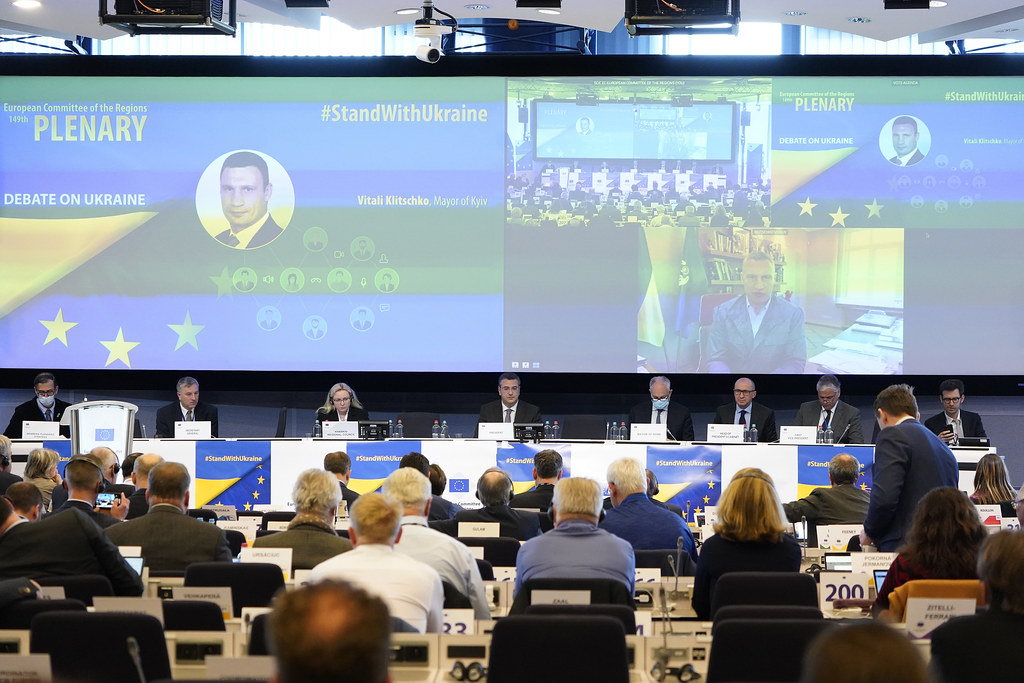The European Committee of the Regions (CoR) offered on Wednesday the expertise of EU’s regions and cities to help Ukraine's local and regional authorities in the reconstruction of the country.
At a debate with the Ukrainian authorities, CoR also called for robust sanctions against Russia and demanded the immediate release of mayors and civil servants kidnapped by Russian occupation forces.
"We condemn the Russian atrocities committed against innocent civilians and every local leader,” said Apostolos Tzitzikostas, president of the CoR and Governor of Greece's region of Central Macedonia. “The EU's local and regional governments will not stop providing humanitarian aid and welcoming the millions of Ukrainians who have fled war.”
“We are ready now to help re-build Ukraine. Our institution is ready to pool experts in spatial planning, urbanism and sustainable development from across European regions and cities. We call on the EU and its member states to increase and facilitate access to funds to help rebuild Ukraine."
The focus of the debates – including with European Commissioners Elisa Ferreira (Cohesion and Reform) and Janez Lenarčič (Crisis Management) – was firmly on the experiences of the mayors of among others Kyiv, Mariupol, Melitopol, Lviv and Kharkiv and the challenges facing them.
The mayors highlighted the contribution that reforms to decentralise powers to Ukrainian communities had made to Ukraine's survival. They also emphasised the need to start reconstruction work immediately, with the support of EU cities and regions.
Vitaly Klitschko, mayor of Kyiv and – since March – an honorary member of the CoR, called for the immediate withdrawal of Russian troops, but cautioned people from returning, because of ongoing missile attacks, unexploded munitions and widespread destruction of some of the most densely populated parts of the city.
Vadym Boychenko (Mariupol) said work needs to begin on rebuilding Ukrainian cities based on "the principles of modern European urbanism" and suggested that "for every ruined city, there could be a twin city in Europe".
Andriy Sadovyi (Lviv) called for a "new push, a new wave" of efforts to establish twinnings and partnerships between EU and Ukrainian communities. Tetiana Yehorova-Lutsenko (chairwoman of the Kharkiv District Council) said Ukrainians were "very proud" of their mayors.
Before the war, Ukraine's ministry for regional development frequently noted in meetings with the CoR that opinion polls shows that 80% of Ukrainians approved of Ukraine’s decentralisation reforms.
In its resolution, CoR underlines that “Ukraine's decentralisation and regional development reforms have contributed significantly to the consolidation of local democracy, strengthened self-governance and the overall resilience of the country's local communities, which is an important element of Ukrainian resistance against the Russian invaders”.
The CoR has been working with Ukrainian cities and regions since 2010, setting up a task-force on decentralisation in 2015 and later a working group. Decentralisation is one of the key public administration reforms in the enlargement process which Ukraine hopes to start after having applied for EU membership and filled in the Commission’s questionnaire.
Lessons learned from previous enlargements show that good governance starts on the local level. Candidate countries need to reform both central and local (self) government. A decentralisation strategy, as part of an overall strategy for public administration reform, is particularly relevant for Ukraine and other countries with significant minority populations and ethnic, linguistic and cultural diversity.
M. Apelblat
The Brussels Times

